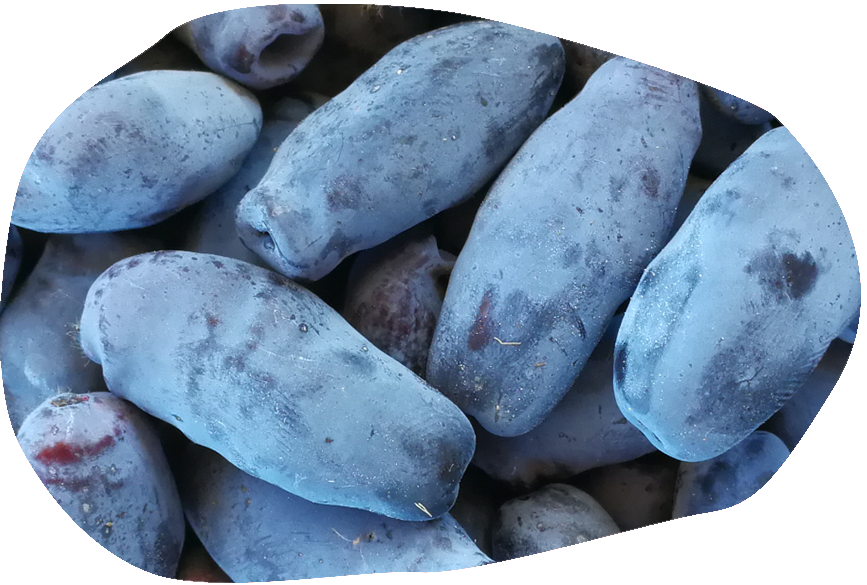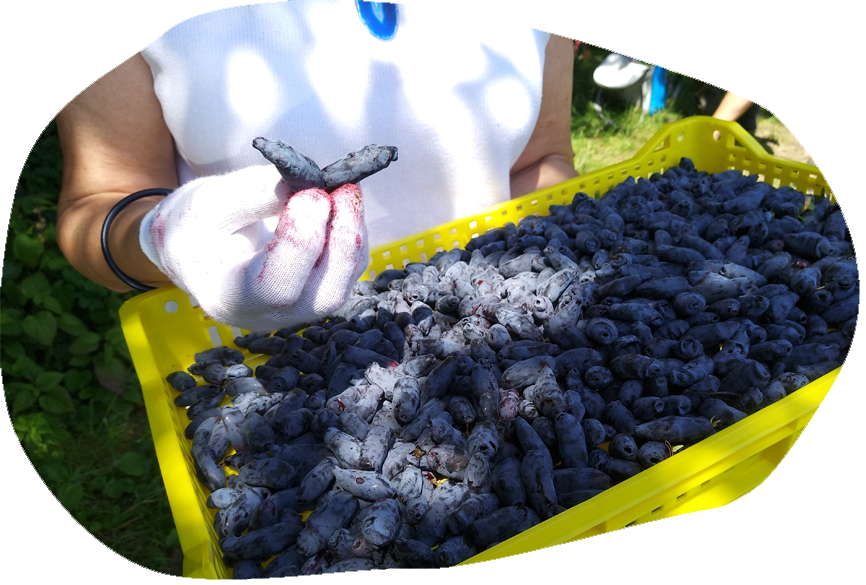In folk medicine, haskap berries were used as an agent enhancing capillaries in cardiovascular diseases, as well as other disorders of the stomach, liver, gallbladder. They enhance excretion of radioactive substances.
Haskap berries are advised for eating in avitaminosis, when a weakened by winter organism is in need of ascorbic acid. Haskap berry juice cures mycosis and ulcers, and a clear soup of flowers and leaves is good for eye, throat, and skin diseases.
In Tibetan medicine, a clear soup from its bark was prescribed as a remedy for headaches, rheumatism, arthritis, and acute stomach pains. A water extract from its flowers, used as a compress, is used for treating eye diseases. Crumpled leaves are used in wound treatment for their antiseptic properties. Dried young shoots, collected during blooming, are used to prepare an extract that is both a diuretic and an anti-hair loss agent.
The berries in their fresh state are good for consumption, as well as any type of processing: for pie, ice-cream, yoghurt, compote,smoothy, juice, gin and wine. Due to its high levels of pectins (2%), these fruits are also used in gelatinization, and are perfect for making stews and jams. Jam packed full of anti-oxidants (up to 4 times that of a forest blueberry!), more vitamin C than orange, and nearly as much potassium as a banana - these little guys earn the right to be called ‘superberries’.
Its cherry colour is a great dye for other juices and food products. Dried fruits retain all their valuable properties. They may also be frozen, and when unfrozen they fall apart to a smooth mass which is a mousse especially good for desserts.


Haskap berries are highly nutritious fruit with a powerful, deep flavour. High in vitamins and antioxidants, they are a very healthy, versatile fruit and can be successfully used fresh, frozen or processed.
The fruits are full of vitamins, including: carotenes (provitamin A), thiamine (B1), riboflavin (B2), folic acid (B9), pyridoxine (B6), rutin (P), as well as pectin and tannin. They also contain natural macroelements (magnesium, boron, sodium, potassium, calcium, phosphorus) and microelements (manganese, copper, barium, silicon, iodine) advantageous to the human organism.
In terms of levels of vitamin C, haskap berries are similar to lemons with their fruits containing 40-60 mg%, and leaves even to 200 mg% (surce: Сады России; Lidia Vasilievna Yurina).
Other sources present the vitamin C at levels up to 150 mg/100 g (surce:Сады России; Vladimir Sergeevich Ilyin).
The fruits contain 50% more of polyphenols (including 5 times more anthocyanins), and over twice as much active antioxidants in comparison to bill berries V. myrtillus. According to researches the level of antioxidants is higher than of any tested fruits. Oxygen Radical Absorbance Capacity (ORAC) rating amounts to 13,400 mmol/100 g - a remarkable result! Additionally, the amount of phenols at the level of 1,014 mg/100 g, anthocyanins - 949 mg/100 g, bioflavonoids - 887 mg/100g.
The fruits have large amounts of dry mass (19%), sugar (12.5%) – mainly glucose (75%), sucrose (up to 11.4%), and smaller amounts of fructose, galactose, rhamnose. Fresh fruit contain also great amounts of dietetic products, such as sorbitol and inositol. The above-mentioned substances are crucial for anticancer, heart diseases, and diabetes.
Portion of 100 g of haskap berries contains app. 300-500 mg of anthocyanins.
Nutrition (100g serving):
HEALTH BENEFITS
There are a number of health benefits to eating fruit, and the haskap berry has significant nutritional properties that make it stand out in comparison to other popular berries.
The information on this page is taken from a number of scientific studies and are analyses of the fruit, not of any value-added or processed products. It is also important to state that nutritional properties vary with cultivar, ripeness, growing location and soil.
These berries seem to be prospective sources of health supporting phytochemicals that exhibit beneficial activities such as anti-adherence, antioxidant and chemoprotective, thus they may provide protection against a number of chronic conditions, e.g. cancer, diabetes mellitus, tumor growth or cardiovascular diseases.
Vitamin C is actually also an antioxidant that potentially helps to neutralize free radicals responsible for many chronic diseases. . Immune health is another big reason we take Vitamin C. The Haskap berry has a vitamin C content higher than that of an orange, contents range from 50mg-100mg/100g of the berries, outranking Blueberries.
As you can see from the table, the Haskap comes a very close second to the leading high-potassium fruit – the banana.
Inflammation is the underlying cause for chronic diseases, and these berries are known for their protection against chronic diseases. Haskap is rich in polyphenols that have the ability to act as an excellent inflammation determent. It also contains anthocyanin that has anti-inflammatory properties and might help prevent or fight against gingivitis and rheumatoid arthritis.
This anthocyanin-rich food may help keep your eyes healthy. Anthocyanin is proven to be beneficial for good eyesight. This helps increase circulation within the retinal capillaries, enhancing the night vision. It also helps fight macular degeneration and prevents retinopathy in diabetic patients.
Oxidative DNA damage is said to occur thousands of times per day and in every single cell in the body. It is the part of the reason we grow older and plays an important role in the development of cancer cells. A study conducted proved that those who consumed haskap on a daily basis reduced their free radical content in the body by 25 percent.
This anthocyanin-rich fruit may help you keep your veins healthy by nullifying the enzymes that destroy connective tissue, by repairing the damaged proteins in the blood-vessel walls. It helps in promoting healthy circulation of blood through your heart. The oxidation of LDL is a crucial step in the heart disease process. The antioxidants in haskap berries are strongly linked to reducing the levels of oxidised LDL. Another study has shown that consuming 75 grams of haskap berries with the main meal greatly reduced the oxidation of LDL lipoproteins. It contains additional chlorogenic acid and phytochemicals that may provide a healthy cardiovascular benefit by controlling blood pressure.
This anthocyanin-rich fruit may help you keep your veins healthy by nullifying the enzymes that destroy connective tissue, by repairing the damaged proteins in the blood-vessel walls. It helps in promoting healthy circulation of blood through your heart. The oxidation of LDL is a crucial step in the heart disease process. The antioxidants in haskap berries are strongly linked to reducing the levels of oxidised LDL. Another study has shown that consuming 75 grams of haskap berries with the main meal greatly reduced the oxidation of LDL lipoproteins. It contains additional chlorogenic acid and phytochemicals that may provide a healthy cardiovascular benefit by controlling blood pressure.
Haskaps are among the most nutrient-dense berries where a single cup serving contains 4 grams of fibre, 24% vitamin C, 25% Manganese and 36% percent vitamin K. Also, it contains about 84% of water, and an entire cup only contains 85 calories with 15 grams of carbohydrates, making it an excellent source of several important nutrients.
Antioxidants protect our bodies from the damage of free radicals and unstable molecules that can cause cellular damage, fast ageing and life-threatening diseases like cancer. They are believed to be one of the highest carriers of anti-oxidants. They have been responsible for the direct increase of anti-oxidants in our body.
High blood pressure is one of the main reasons for several diseases. And apparently, haskap berries appear to have significant benefits for people with high blood pressure. One study conducted with obese people noted 6-7 percent reduction in blood pressure after consuming 50 grams of haskap berries for eight weeks.
Oxidative stress results in brain’s ageing process and can have a negative effect on brain function. The anti-oxidants present in haskap berries tend to stimulate in the areas of the brain that are important for intelligence. These anti-oxidants directly interact with the ageing neurones which leads to improvements in the cell functioning.
Several studies have shown that honeyberries have anti-diabetic effects. The bioactive compounds in honeyberry cancel out any negative impact on the sugar that leads to maintaining the blood sugar level. The anthocyanins present in haskap berries have beneficial effects on the insulin and glucose sensitivity. Consuming haskap berry smoothie can cause major improvements in the insulin sensitivity and lowers the blood sugar level.
Like blueberries, haskap berries contain substances that can help prevent the bacteria binding on the wall of the urinary bladder. These infections are a very common problem in women and haskap berries maybe useful in preventing such type of infections.


